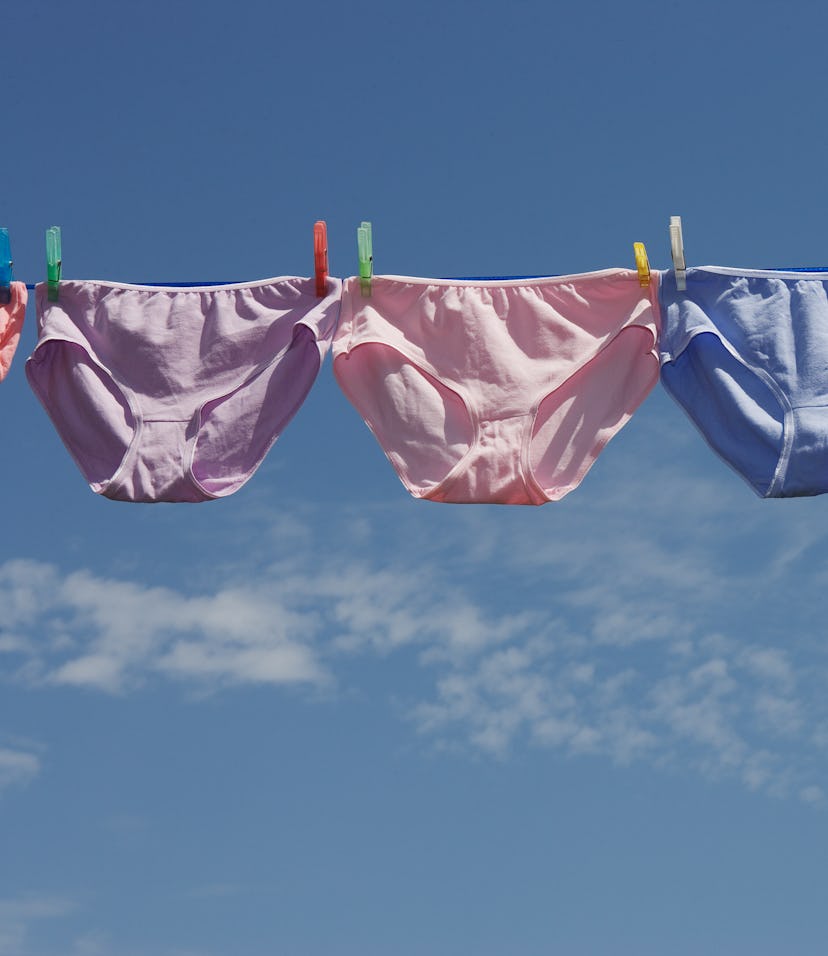Health

Why Your Vagina Smells Like Fish & What To Do About It
Women’s health experts explain.
You are what you eat sometimes, and that also goes for how you smell down there. Ever notice when you eat garlic or asparagus, your pee (and sometimes your discharge or vagina) kinda smells like garlic or asparagus? But what about seafood? If you were recently in a downward facing dog position at yoga class and caught a whiff of a fishy smell coming from down there, you may be wondering, “why does my vagina smell like fish?” it’s definitely not because you ate fish, and it is actually something you need to get checked out by a doctor ASAP.
Why does my vagina smell like fish?
Your vagina should definitely never ever smell like fish, says Dr. Kameelah Phillips, an OB-GYN. If it does smell like fish, something is wrong. But the good news is that it’s treatable. “The most common reason for this is a bacterial infection called bacterial vaginosis (BV),” Phillips says. What exactly is this scary sounding ailment and what causes it? It’s an imbalance of vaginal flora, which causes that fishy odor down there, Phillips explains.
Barbara Slocum, board-certified women’s health nurse practitioner and certified nurse midwife agrees and explains in an email interview, “BV is triggered by a change in the vaginal pH that allows an overgrowth of a ‘bad’ bacteria (that normally resides in harmony with the good bacteria) in the vagina.”
How do you treat bacterial vaginosis?
And just how soon will that fishy smell go away? “This imbalance often requires an antibiotic to treat, but some may notice a spontaneous resolution after a period, with probiotics, or within a short time frame, i.e., your vaginal flora corrected itself. Don't be discouraged if you have a recurrence of the odor. Sometimes multiple treatments are required to correct the imbalance,” Phillips says.
What should a healthy vagina smell like?
I asked Slocum if it wasn’t supposed to have an odor at all if it was healthy, and she reminds us that “the vagina does not, nor should it, smell like potpourri. For some reason, women have been told and now believe that their vagina should either be odorless or smell like a field of roses — neither is true. Additionally, many are concerned about vaginal discharge, and I like to remind them that the vagina is self-cleaning, and as long as the discharge is colorless, without odor, and does not cause itching or burning, it is probably totally normal,” she explains.
“Most vaginas have some type of odor, especially after a work day, physical exercise, or during a period,” Phillips adds. “I tell women your vagina should smell like you and ‘you’ will vary throughout the month.”
She also notes that a “normal odor” is typically hard to describe. “Do not hesitate to smell your underwear — don’t cringe, they belong to you,” Phillips says. “This will help you get an idea of your normal scent and make it easier for you to detect a change when the scent goes awry.”
What is normal when it comes to vaginal discharge?
When it comes to your discharge, there can be some changes throughout your cycle. “Discharge varies throughout the month, and may be clear, white, or yellowish. It can be watery or creamy. Looking at your underwear can help you notice a change in your baseline,” Phillips says. Different odors to look out for include fishy or yeasty smells, which may indicate you have an infection, according to Phillips.
Both Phillips and Slocum say not to douche or flush your vagina out. “A vagina and the perineal region should be cleaned with a soft cotton washcloth and warm water only. Avoid washing the vagina with soaps, body scrubs, or detergents... read your soap, it may actually be considered a detergent,” Slocum says.
“I really believe you should keep soap and other cleaners out of your vagina,” Phillips agrees. “Your vagina is self-cleaning so why would any product be necessary? I suggest cleaning the outer labia, hair-bearing areas, including the anus, with a mild wash and keeping the suds out of the vagina.”
If a woman is concerned about a vaginal odor, Slocum suggests they should contact their health care provider. Too often I have women using at-home remedies that either cause an increase in symptoms, or do nothing to treat the cause.
Good perineal hygiene includes avoiding all perfumes and sprays in the area, avoid tight-fitting clothes like skinny jeans (especially when symptomatic), getting out of wet and sweaty exercise clothing, steering clear of thongs, and avoiding fabric softeners and using scent-free soap when you’re washing your undies, according to Slocum. Additionally, if you're taking antibiotics, it's also a good idea to take a probiotic or eat yogurt to keep the good bacteria and bad bacteria balanced in there.
While not super serious, if you notice a “fishy” smell that is not normal for you, you may want to call your health care provider. Not only because it's unpleasant for you, but you don't want an infection lingering around in your lady bits. Keep clean down there, and steer clear of those advertised feminine hygiene cleansers. Your vagina is good at cleaning itself out, and adding stuff to that balance will throw everything out of whack.
Experts:
Dr. Kameelah Phillips, an OB-GYN
Barbara Slocum, board-certified women’s health nurse practitioner
This article was originally published on